Unit 11 How was your school trip? Section A (1a-2d)课件
文档属性
| 名称 | Unit 11 How was your school trip? Section A (1a-2d)课件 | 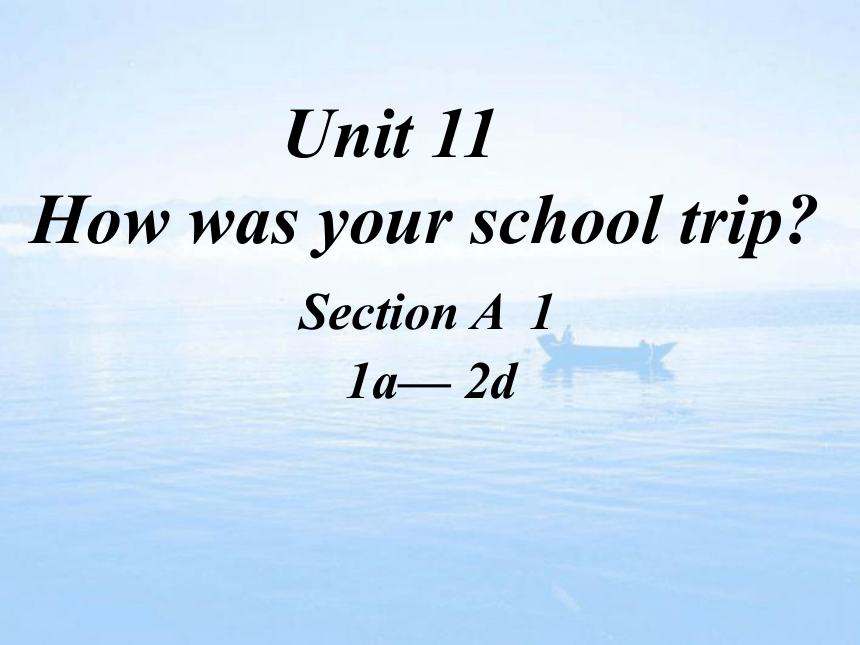 | |
| 格式 | zip | ||
| 文件大小 | 4.8MB | ||
| 资源类型 | 教案 | ||
| 版本资源 | 人教新目标(Go for it)版 | ||
| 科目 | 英语 | ||
| 更新时间 | 2014-06-02 17:24:28 | ||
图片预览

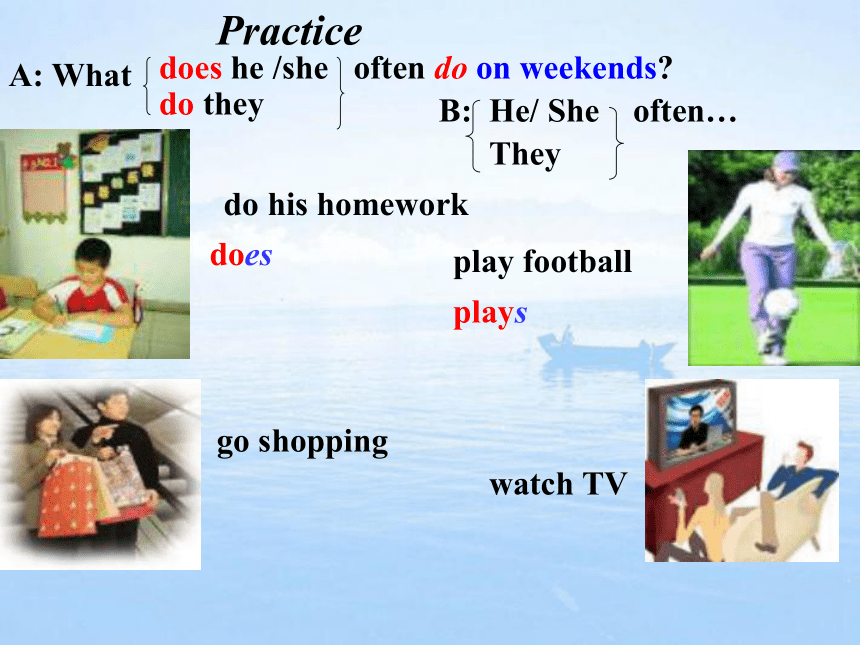
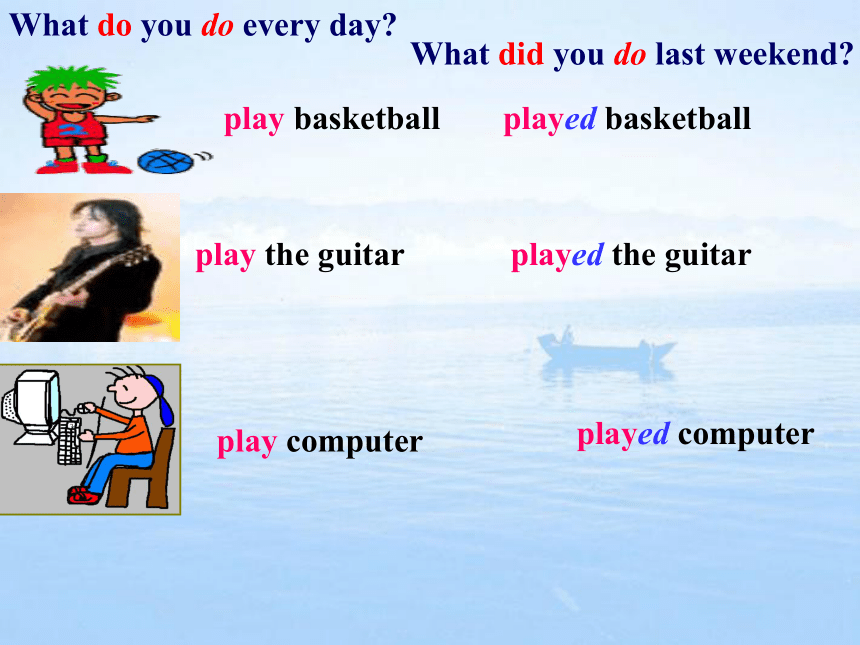
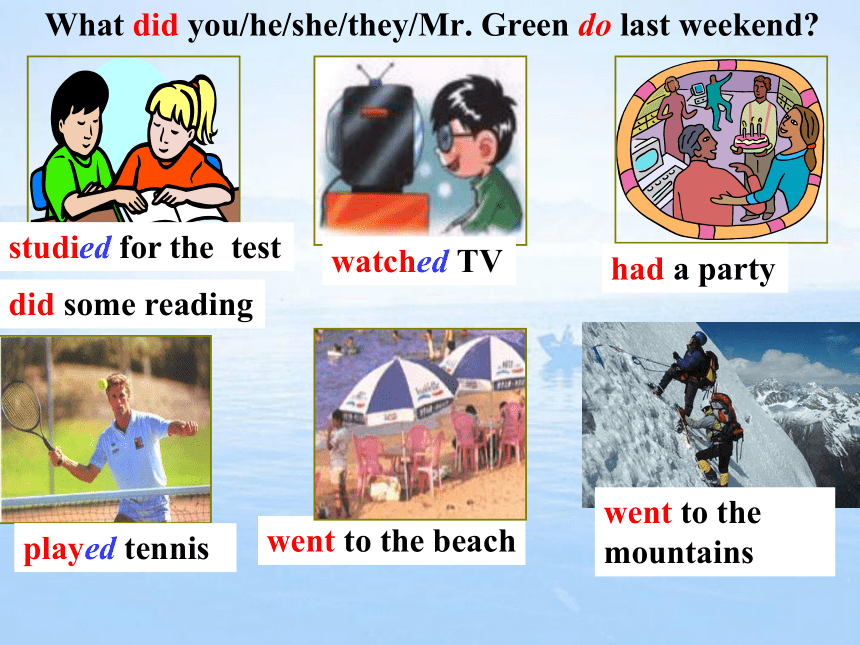
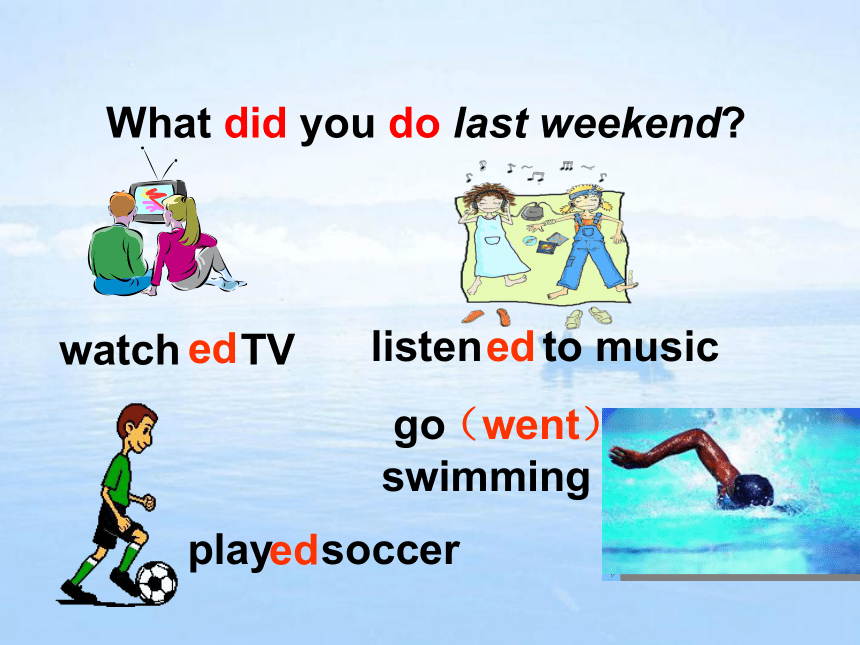
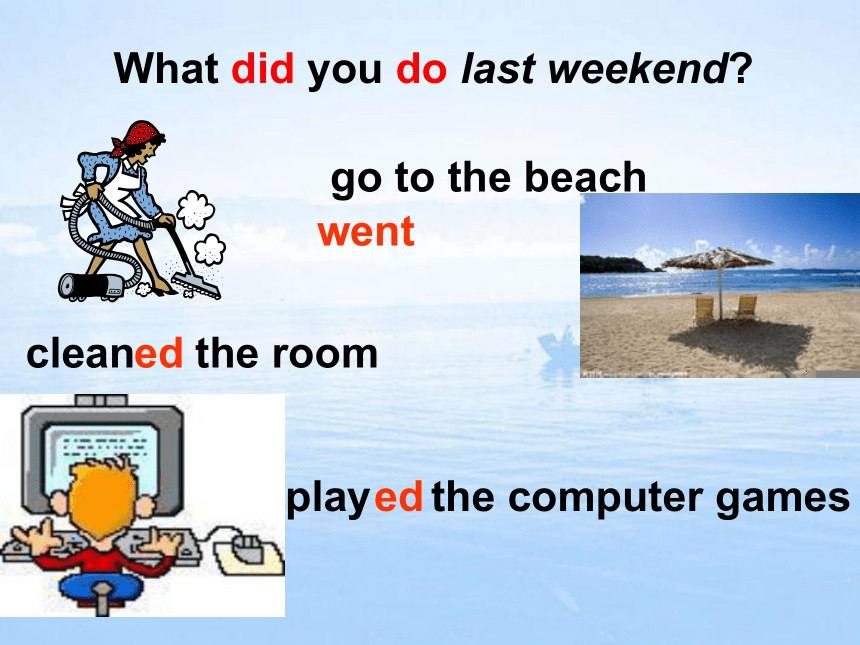
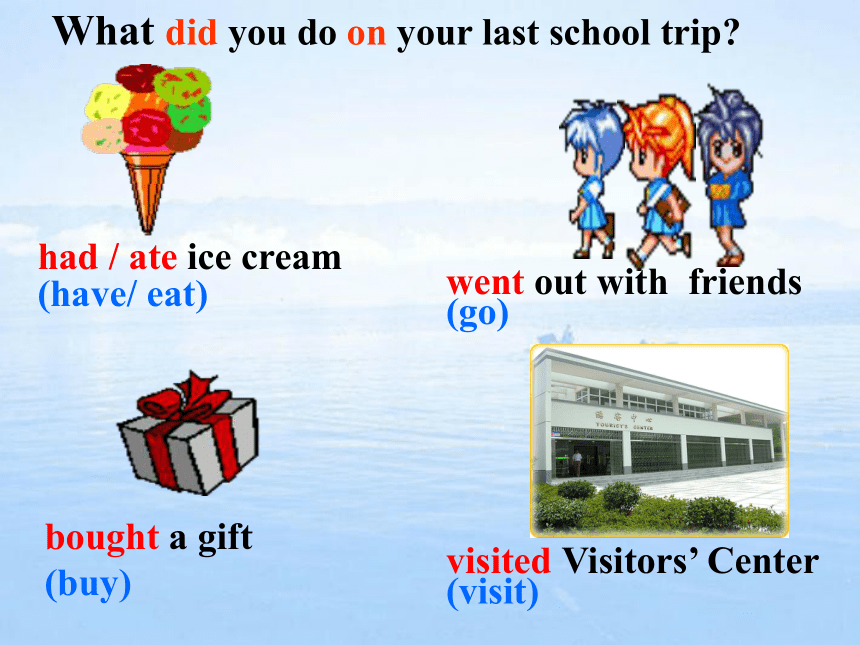
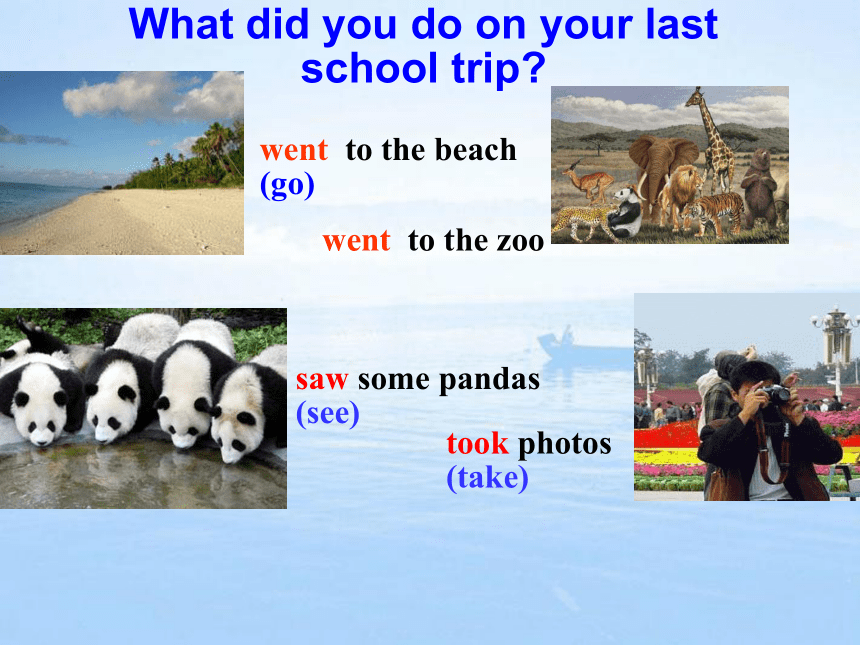
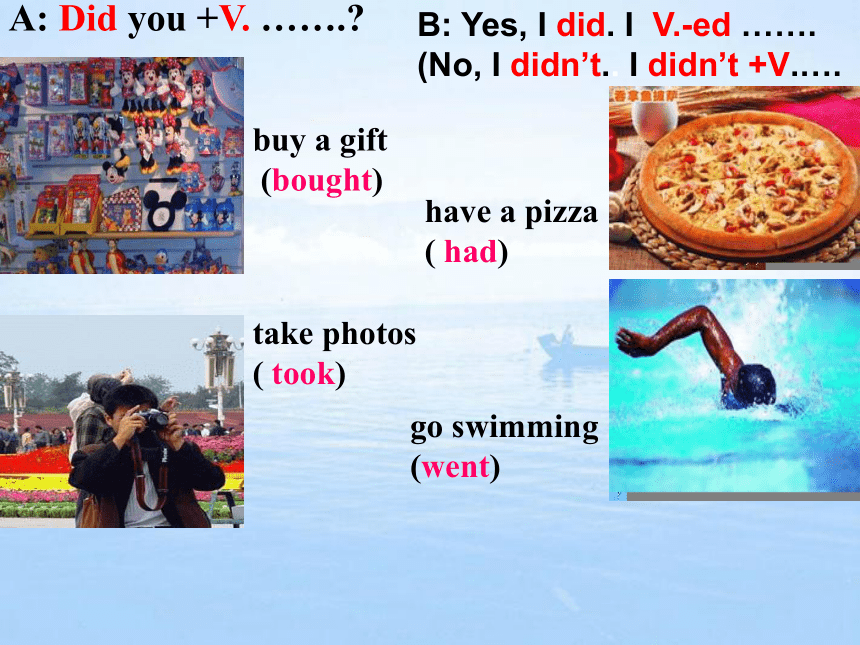
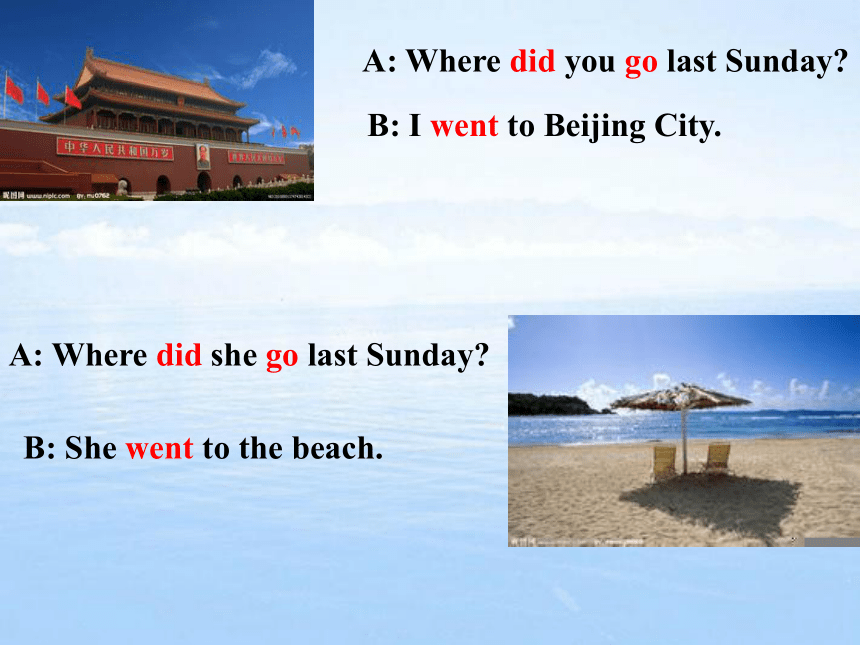
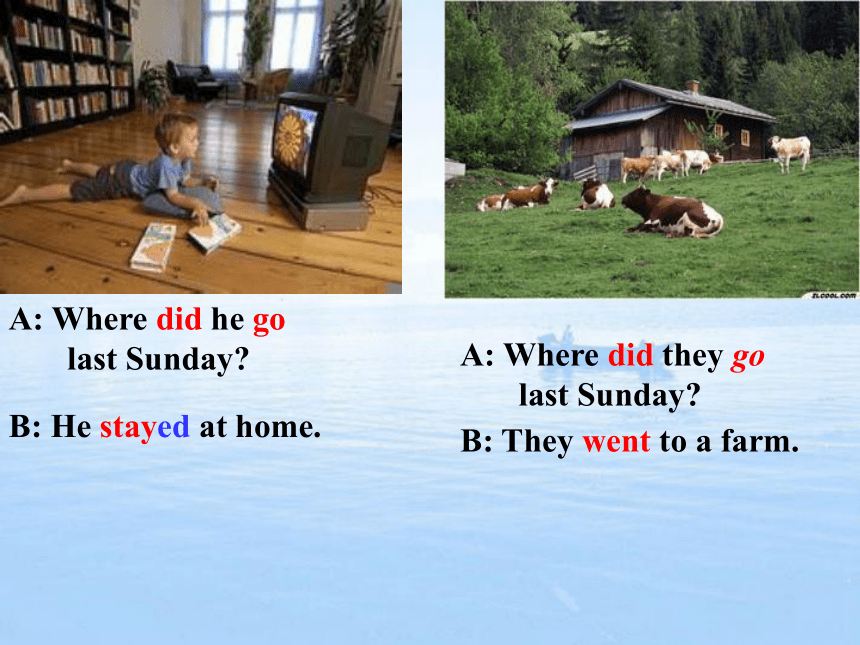
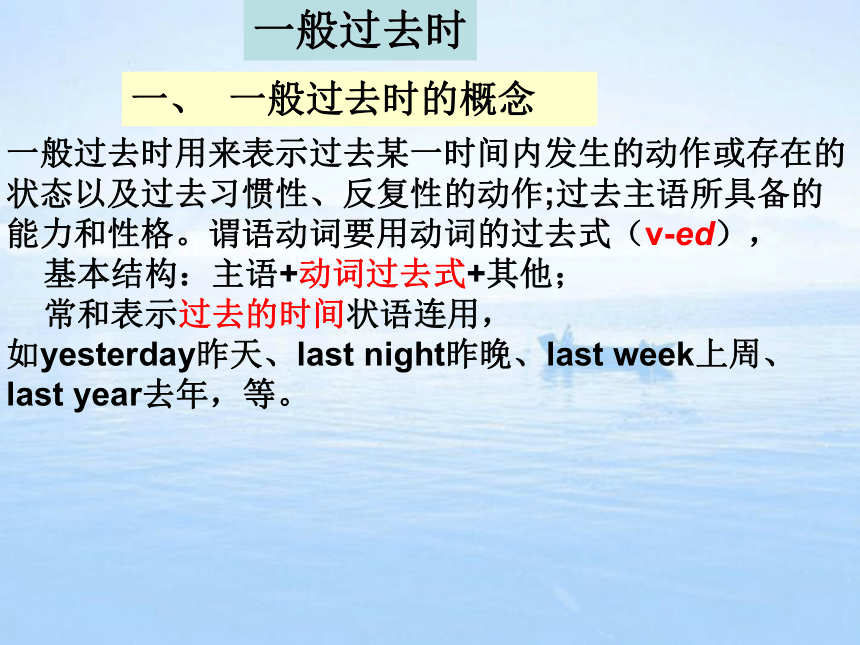
文档简介
课件57张PPT。 Unit 11
How was your school trip?
Section A 1
1a— 2dB: He/ She often…play footballdoes he /she often do on weekends?Practicedo his homeworkdo theygo shoppingwatch TVTheyA: Whatdoesplaysplay the guitarplayed the guitarplay computerplayed computerWhat do you do every day?What did you do last weekend?play basketballplayed basketballWhat did you/he/she/they/Mr. Green do last weekend?studied for the testwatched TVhad a partyplayed tenniswent to the beachdid some readingwent to the mountainsWhat did you do last weekend?watch TVlisten to musicplay soccer go
swimmingeded(went)edWhat did you do last weekend?clean the room play the computer gamesgo to the beachededwentbought a gift
(buy)had / ate ice cream
(have/ eat)went out with friends
(go)
What did you do on your last school trip? visited Visitors’ Center
(visit)
What did you do on your last school trip?went to the zoosaw some pandas
(see)went to the beach
(go)took photos
(take)A: Did you +V. …….?take photos ( took) go swimming
(went) have a pizza ( had)buy a gift
(bought) B: Yes, I did. I V.-ed …….
(No, I didn’t.. I didn’t +V.….A: Where did you go last Sunday?B: I went to Beijing City.A: Where did she go last Sunday?B: She went to the beach.A: Where did he go
last Sunday?B: He stayed at home.B: They went to a farm.A: Where did they go
last Sunday?一般过去时用来表示过去某一时间内发生的动作或存在的状态以及过去习惯性、反复性的动作;过去主语所具备的能力和性格。谓语动词要用动词的过去式(v-ed),
基本结构:主语+动词过去式+其他;
常和表示过去的时间状语连用,
如yesterday昨天、last night昨晚、last week上周、
last year去年,等。一般过去时一、 一般过去时的概念 ????1. Be动词的一般过去时?
肯定句式:主语 + was / were + 其它.?
否定句式:主语 + wasn’t /weren’t+ 其它.?
一般疑问句:Was/Were + 主语 + 其它?
肯定回答:Yes,主语+ was / were .
否定回答:No,主语+ wasn’t /weren’t. There be There was/were+某人、某物+某地、某时
表示在过去的某地某时有某人某物的存在
?2. 行为动词(v.)的一般过去时态 ?
肯定句式:主语 + v-ed+ 其它.
?否定句式:主语 + didn’t + v原形+ 其它.
一般疑问句:Did + 主语+ v.原形+ 其它?
肯定回答:Yes,主语+did.
否定回答:No,主语+did’t. wasn’t
=was not
weren’t
=were not【did not = didn’t】?【do , does
---did】am/is ---was are---were?二、一般过去时的结构(可分三类不同的结构)?注意:1.? did和didn’t 是构成一般过去时的助动词,
其特点是要在其后跟动词的原形。
?? ?? 2.? 实意动词do的一般过去时?
I? do ?my? homework? every day.(用yesterday改写句子)
I? ____my? homework? yesterday.
I? _________?my? homework? yesterday.(否定句)
____?you ?____ ?your? homework? yesterday?
Yes ,I did.?? /No, ?I didn’t.(一般疑问句)They ______ (have) a good time yesterday.
They ___________ (not watch) TV last night.
____ you _____ (go) to the park yesterday?
Yes, I____. / _____, I didn’t.haddidn’t watchDidgodidNodid ?didn’t doDiddo3. 情态动词的一般过去时态 ?
肯定句式:主语 + 情态动词的过去式 +v原型+ 其它.
否定句式:主语 + 情态动词的过去式 + not +v原型 + 其它.?
一般疑问句:情态动词的过去式 + 主语 + v原型+ 其它??
注:情态动词的过去式:can→_____ , may→______,
must→_____ ,will-______,shall-______。?
4.特殊疑问句式:
1)特殊疑问词+was/were+主语+其他?
?2)特殊疑问词+情态助动词过去式+主语+v.原形+其他?
?3)特殊疑问词+did+主语+v.原形+其他?
??1)____ ____he late for school last Monday?
他上周一为什么上学迟到了?
2)_____ ______she ____twenty years ago?
20年前她能做什么?
3)_____ _____you_____ yesterday?昨天你去哪了??特殊疑问词+ 一般疑问句?wascoulddoWhyWhatWheredid gocouldmightmustwouldshould一般过去时的判断标志词 yesterday ,
yesterday morning, the day before yesterday ,
last + 时间 , this morning, 时间 + ago ,
just now , a moment ago , in + 过去的时间 , 等。
注意:一般过去时表示过去经常或反复发生的动作,
也常和often经常,always总是,once a week一周一次,
等表示频度的时间状语连用。三、一般过去时的判断标志词1. 规则动词的过去式
1) 一般情况下,在动词原形后面加-ed。
2)以不发音e结尾的动词,在词尾直接加-d。?
3)以“辅音字母+ y”结尾的动词,先将 y 改为i ,再加 –ed。
4)以重读闭音节(即辅音+元音+辅音)末尾只有一个
辅音字母的动词,要先双写这个辅音字母后,再加 –ed。口诀:一加ed,二加d,三要双写,
四注意,y变成ied,特殊形式特殊记。四、动词过去式的构成look?
watch???
start???
visit?
pull?looked??
watched????
started???
visited?
pulledcook
live???
use??
taste
studycooked
lived???
used??
tasted
studiedtry??????
play
stop?
plan?
stoptried??????
played
stopped?
planned?
stopped2.不规则动词的过去式需特殊记忆。
am(is) are(是)
can(能) ? do/does(做,干)?
have (has)(有) go(走)
come(来) feed (喂)
buy (买) ? eat(吃)
grow(生长) ride (骑)?
run(跑) ? say (说)
see (看见) ?? get(变得,到达)
teach(教) take(带)
swim(游泳) learn(学习)was
could ?
had
came
bought
grew?
ran
saw?? ?
taught
swamwere
did?
went
fed
ate
rode
said?
got
took
learned
learnt① 表示过去某个时间发生的动作或存在的状态。
? My father _______in Shanghai last year.
我爸爸去年在上海工作。
②表示过去的习惯性或经常发生的动作,常和often经常,
always总是,once a week一周一次,等表示频度的时间
状语连用。
I often _____________on foot.(过去)我经常步行去上学。
③与when等连词引导的?状语从句连用。
When she got home,she _____a short rest.
当她到家时,她稍微休息了一下。五、 一般过去时的基本用法workedwent to schoolhad
小试身手把下列句子变成否定句,一般疑问句,肯否回答及对划线部分提问1.The air was clean yesterday.
The air wasn't clean yesterday.
Was the air clean yesterday?
Yes, it was./ No,it wasn't.
How was the air yesterday?
2.Tom and Peter were at home last night.
Tom and Peter weren't at home last night.
Were Tom and Peter at home last night?
Yes, they were./No.they weren't.
Where were Tom and Peter last night.3.There was a bird in the tree just now.
There wasn't a bird in the tree just now.
Was there a bird in the tree just now?
Yes, there was. No,there wasn't.
What was in the tree just now?
4.I rode a horse last Sunday.
I didn't ride a horse last Sunday.
Did you ride a horse last Sunday?
Yes,I did./No,I didn't.
What did you do last Sunday?
When did you ride a horse?12 Do you know what animals there are on the farm?farmn.
v.on the/a farmchickensducksgoosedogspigshorsescowssheepgeesesheepfarmerfeedmilkpickfarmgrowgo for a walkmilk a cowride a horsePhraseswent for a walkrode a horsetalk with a farmerpick strawberriesfeed chickensfed chickenstake some photosvisit my grandparentsgo fishingtook some photosclimb a mountainwatch the starsgo to the zoovisit a museumvisit a fire stationwatch flowersWhat do you do every day?
What did you do last weekend?
feed chickensmilk a cowride a horsefed chickensmilked a cowrode a horseWhat does he/she do every day?
He /She....What did he/she do yesterday?watched the starstakes some photostook some photosgoes fishingwent fishingwatches the starsWhat do theydo every day?What did theydo last week?go for a walkwent for a walkwatch flowerswatched flowerspick strawberriespicked strawberriesDid you......yesterday?
Yes,I did./No,I didn't.play basketballwatch TV
play computer gamesDid he/she......yesterday?
Yes, he/she did.
No,he /she didn't.talk with a farmerwatch the starsstay at home
play tennisvisit a fire stationvisit a museumDid they......last Tuesday?
Yes, they did.
No, they didn't.pick strawberriesLook at the picture.
This is a farm. Last week Carol and his classmates had a school trip. They went to the farm.
What did they do on the farm?
How was their school trip?He_____a horse.
____he _____a horse?
Yes, he____._____he _____a cow?
____, he did. He______ a cow.What did he do on the farm?rodeDidridedidDidmilkYes milked_____he _____(ride) a horse?
No, he_____.
_____he _____chickens?
Yes, he___. He ____chickens.____he____ to the zoo?
___, he didn’t. He _____to a farm.
____he see any cows?
Yes, he did. He ____quite a lot.Diddidn’tDidfeeddidfedDid gowentDidsawrideNo____they _____any strawberries ___the farm?
Yes, they____.
How _____the strawberries?
They _____delicious.
_____the strawberries good?
Yes, they____.
No, they_______.How _____their school trip?
It ____great.DidpickondidwerewereWerewereweren’twaswas1a Match the phrases with the pictures. went for a walk milked a cow rode a horse fed chickens talked with a farmer took some photosebacfdwent for a walk
=take a walk feed+食物+to把…喂给…吃
feed on 以…为食
1.Please ____some grass ___the cow.
2.Sheep ______grass.绵羊以草为食。feedtofeed onfed-feed1b Listen and circle the three things
Carol did on her school trip in 1a.Listeningwent for a walk milked a cow
rode a horse fed chickens
talked with a farmer took some photos补书插图(1)quite a lot (of)+(不)可数名词,
相当多 e.g. 1)We drank ______________wine.我们喝了不少酒。
2) I saw ____________ cows.我看到了相当多的奶牛。
3) I play tennis ___________in the summer.
夏天我经常打网球。
4) _____________students were late.不少学生迟到了。
(2) quite +a/an+形容词+n.=a very +形容词+n.
1) It’s ____________________ car.这是一部相当漂亮的车。
2) He’s _______________boy.他是一个相当聪明的男孩。1. —Did you see any cows? —Yes, I did. I saw quite a lot.Language pointsquite a lot ofquite a lot ofquite a lotQuite a fewquite a littlequite a fewQuite a lot ofquite a few +可数名词
quite a little +不可数名词quite a nice/a very nicequite a clevera very cleverA: Did Carol take any photos?
B: Yes, she did.
A: Did Carol ride a horse?
B:
A: Did Carol talk with the farmer?
B: 1c Ask and answer questions
about Carol’s school trip.Speakingtake与photo, picture等词搭配时,表示“拍摄,摄影”。表示“拍摄某物或人”,就要在短语后面接介词“of”引入所拍摄的对象。 take a photo/take photos of 为…拍照
e.g. 1) He _____________________his mother.
他拍了他妈妈的许多照片。
2) Don’t ___________here.不要在这里拍照。2. Did Carol take any photos? 卡罗尔拍照片了吗?took many photos oftake photos__What did the farmer say? ___Did you grow any apples?
__What did you see? ___Do they grow apples?
__Did you learn anything? ___Did you eat them?
__Did you ask him any questions? ____Were they good?2a Listen and check the questions you hear.Listening√√√√anything 不定代词,“某事,某东西”,
主要用于否定句,疑问句中代替something,
He saw something. --否? He__________________.didn’t see anything1 The farmer showed Carol
around the farm. T F
2 Carol learned a lot about
farming T F
3 The farmers grow strawberries
from December to June. T F
4 The farmers don’t grow apples. T F
5 Carol picked some strawberries
and took them home. T F2b Listen again. Circle T for true or F for false.show sb. around+某地
带领某人参观……learn about+n/代词/v-ing
了解/知道有关…
=know about…pick…采摘,挑选
pick up 捡起,拾起
2c Ask and answer questions about
Carol’s visit to the farm.
A: What did Carol do?
B: She picked some strawberries.SpeakingPeter: Hi, Eric. How was your trip last week?
Eric: It was excellent. I visited my grandparents in the countryside.
Peter: Oh, nice. What did you do?
Eric: I went fishing every day. And I fed the chickens with my grandpa. It was so much fun.
Peter: Sounds good. How was the weather there?
Eric: It was great, and the air was so clean. I watched the
stars at night. They were so beautiful.
Peter: Lucky you.2d Role-play the conversation. How was your trip last week? 上周你的郊游怎么样?
How was…? 询问某事情况句型
答语: It was great. It was OK. It wasn’t good.
All right. (很好) It was not bad. 等
How +be+…?? what +be +…+like?
Eg: _____ ___her holiday? 她的假期过得怎么样?
__ ___ ___ ____.还不错。
2. It was excellent. 太好了。
excellent adj.极好的,优秀的 ?
Eg: The food is__________ here.这里 的食物很好。
She is an __________ doctor.她是位优秀的医生。
3. I visited my grandparents in the countryside.
我在乡下看望了我的祖父母。
in the countryside 在乡下?
country n.国家,农村,乡下 adj. 乡下的 How wasIt was not bad excellent excellentvery goodin the country4. It was so much fun. 非常有趣。
fun n(u) 表示“乐趣,开心,有趣的事情”,
1) great/much/a lot of+fun 非常有趣(的事)
have fun=have a good time 玩得开心
e.g. The children____ _____ _ ____ ____.(正玩得很开心)
Riding a bike is great____.骑自行车是件很有趣的事。
2) so adv so much 有很多
There is ___ ______water。有很多水。
5. It was great, and the air was so clean.
天气很好,而且是空气是那么干净。
clean adj.?dirty v. 打扫
He is always wearing _____clothes.他总是穿干净的衣服。
We must keep our hands______. 我们必须保持手干净。
She __ _________the blackboard.她正在擦黑板。are having so much funfunso muchcleancleanis cleaning6. Lucky you! 你真幸运!
相当于You’re so lucky.
这是一句非正式口语, Lucky之后的人称还可以改为me, him。I. 写出下列单词的过去式
talk milk
am /is are
go ride
feed take
do seetalked
was
went
fed
did milked
were
rode
took
saw ExerciseII. 译出下列短语
去散步
去购物
去钓鱼
挤奶牛
骑马
骑自行车
喂小鸡
和某人谈话
拍照go for a walk
go shopping
go fishing
milk a cow
ride a horse
ride a bike
feed chickens
talk with …
take photosIII. 用适当的词填空1. How ___ your school trip? It was great.
2. How _____ you yesterday?
3. Today is Monday. Yesterday ___ Sunday.
4. What ___ you do the day before yesterday?
____ you ride a horse last week?
6. ____ he see any cows on the farm? Yes, he did.
7. Did he milk a cow on the farm? No, he ______.
8. Were the strawberries good? Yes, they _______.
9. Did you see any cows? Yes, I did. I ___ quite a lot.
10. I ___ the chickens last week.
was were was did Did Did didn’t were saw fed1.I usually ___(get) up at 6:30 in the morning. Today
I ______ (get) up at 7:20, I ______ (be) late for class.
Mr. Yang ______(tell) me not _______(be) late again.
2. --______you ______ (have) a good time last Sunday?
--No, I _____ (do not). I _____ (go) camping with my
friends, but it __________(rain).
3. –Where ______(be) you last night? I ______ (call) you,
but you ________(be) not in.
–Oh, I _________(be) in my uncle’s house.
I ______ (have) supper there. IV.根据提示完成句子getgotwastoldto beDidhavedidn’twentrainedwerecalledwerewashadV. 汉译英他上周在农场骑马。
2. 他上个月爬山了。
3. 他一小时前喂了小鸡。
4. 你昨天去了动物园吗?没有,我去了农场。
5.你在农场看到一些奶牛吗?看到了,看到了相当多
Last week he rode a horse on the farm.He climbed the mountain last month.He fed chickens an hour ago.Did you go to the zoo? No, I didn’t. I went to the farm.Did you see any cows? Yes I did. I saw quite a lot.Thank you!
How was your school trip?
Section A 1
1a— 2dB: He/ She often…play footballdoes he /she often do on weekends?Practicedo his homeworkdo theygo shoppingwatch TVTheyA: Whatdoesplaysplay the guitarplayed the guitarplay computerplayed computerWhat do you do every day?What did you do last weekend?play basketballplayed basketballWhat did you/he/she/they/Mr. Green do last weekend?studied for the testwatched TVhad a partyplayed tenniswent to the beachdid some readingwent to the mountainsWhat did you do last weekend?watch TVlisten to musicplay soccer go
swimmingeded(went)edWhat did you do last weekend?clean the room play the computer gamesgo to the beachededwentbought a gift
(buy)had / ate ice cream
(have/ eat)went out with friends
(go)
What did you do on your last school trip? visited Visitors’ Center
(visit)
What did you do on your last school trip?went to the zoosaw some pandas
(see)went to the beach
(go)took photos
(take)A: Did you +V. …….?take photos ( took) go swimming
(went) have a pizza ( had)buy a gift
(bought) B: Yes, I did. I V.-ed …….
(No, I didn’t.. I didn’t +V.….A: Where did you go last Sunday?B: I went to Beijing City.A: Where did she go last Sunday?B: She went to the beach.A: Where did he go
last Sunday?B: He stayed at home.B: They went to a farm.A: Where did they go
last Sunday?一般过去时用来表示过去某一时间内发生的动作或存在的状态以及过去习惯性、反复性的动作;过去主语所具备的能力和性格。谓语动词要用动词的过去式(v-ed),
基本结构:主语+动词过去式+其他;
常和表示过去的时间状语连用,
如yesterday昨天、last night昨晚、last week上周、
last year去年,等。一般过去时一、 一般过去时的概念 ????1. Be动词的一般过去时?
肯定句式:主语 + was / were + 其它.?
否定句式:主语 + wasn’t /weren’t+ 其它.?
一般疑问句:Was/Were + 主语 + 其它?
肯定回答:Yes,主语+ was / were .
否定回答:No,主语+ wasn’t /weren’t. There be There was/were+某人、某物+某地、某时
表示在过去的某地某时有某人某物的存在
?2. 行为动词(v.)的一般过去时态 ?
肯定句式:主语 + v-ed+ 其它.
?否定句式:主语 + didn’t + v原形+ 其它.
一般疑问句:Did + 主语+ v.原形+ 其它?
肯定回答:Yes,主语+did.
否定回答:No,主语+did’t. wasn’t
=was not
weren’t
=were not【did not = didn’t】?【do , does
---did】am/is ---was are---were?二、一般过去时的结构(可分三类不同的结构)?注意:1.? did和didn’t 是构成一般过去时的助动词,
其特点是要在其后跟动词的原形。
?? ?? 2.? 实意动词do的一般过去时?
I? do ?my? homework? every day.(用yesterday改写句子)
I? ____my? homework? yesterday.
I? _________?my? homework? yesterday.(否定句)
____?you ?____ ?your? homework? yesterday?
Yes ,I did.?? /No, ?I didn’t.(一般疑问句)They ______ (have) a good time yesterday.
They ___________ (not watch) TV last night.
____ you _____ (go) to the park yesterday?
Yes, I____. / _____, I didn’t.haddidn’t watchDidgodidNodid ?didn’t doDiddo3. 情态动词的一般过去时态 ?
肯定句式:主语 + 情态动词的过去式 +v原型+ 其它.
否定句式:主语 + 情态动词的过去式 + not +v原型 + 其它.?
一般疑问句:情态动词的过去式 + 主语 + v原型+ 其它??
注:情态动词的过去式:can→_____ , may→______,
must→_____ ,will-______,shall-______。?
4.特殊疑问句式:
1)特殊疑问词+was/were+主语+其他?
?2)特殊疑问词+情态助动词过去式+主语+v.原形+其他?
?3)特殊疑问词+did+主语+v.原形+其他?
??1)____ ____he late for school last Monday?
他上周一为什么上学迟到了?
2)_____ ______she ____twenty years ago?
20年前她能做什么?
3)_____ _____you_____ yesterday?昨天你去哪了??特殊疑问词+ 一般疑问句?wascoulddoWhyWhatWheredid gocouldmightmustwouldshould一般过去时的判断标志词 yesterday ,
yesterday morning, the day before yesterday ,
last + 时间 , this morning, 时间 + ago ,
just now , a moment ago , in + 过去的时间 , 等。
注意:一般过去时表示过去经常或反复发生的动作,
也常和often经常,always总是,once a week一周一次,
等表示频度的时间状语连用。三、一般过去时的判断标志词1. 规则动词的过去式
1) 一般情况下,在动词原形后面加-ed。
2)以不发音e结尾的动词,在词尾直接加-d。?
3)以“辅音字母+ y”结尾的动词,先将 y 改为i ,再加 –ed。
4)以重读闭音节(即辅音+元音+辅音)末尾只有一个
辅音字母的动词,要先双写这个辅音字母后,再加 –ed。口诀:一加ed,二加d,三要双写,
四注意,y变成ied,特殊形式特殊记。四、动词过去式的构成look?
watch???
start???
visit?
pull?looked??
watched????
started???
visited?
pulledcook
live???
use??
taste
studycooked
lived???
used??
tasted
studiedtry??????
play
stop?
plan?
stoptried??????
played
stopped?
planned?
stopped2.不规则动词的过去式需特殊记忆。
am(is) are(是)
can(能) ? do/does(做,干)?
have (has)(有) go(走)
come(来) feed (喂)
buy (买) ? eat(吃)
grow(生长) ride (骑)?
run(跑) ? say (说)
see (看见) ?? get(变得,到达)
teach(教) take(带)
swim(游泳) learn(学习)was
could ?
had
came
bought
grew?
ran
saw?? ?
taught
swamwere
did?
went
fed
ate
rode
said?
got
took
learned
learnt① 表示过去某个时间发生的动作或存在的状态。
? My father _______in Shanghai last year.
我爸爸去年在上海工作。
②表示过去的习惯性或经常发生的动作,常和often经常,
always总是,once a week一周一次,等表示频度的时间
状语连用。
I often _____________on foot.(过去)我经常步行去上学。
③与when等连词引导的?状语从句连用。
When she got home,she _____a short rest.
当她到家时,她稍微休息了一下。五、 一般过去时的基本用法workedwent to schoolhad
小试身手把下列句子变成否定句,一般疑问句,肯否回答及对划线部分提问1.The air was clean yesterday.
The air wasn't clean yesterday.
Was the air clean yesterday?
Yes, it was./ No,it wasn't.
How was the air yesterday?
2.Tom and Peter were at home last night.
Tom and Peter weren't at home last night.
Were Tom and Peter at home last night?
Yes, they were./No.they weren't.
Where were Tom and Peter last night.3.There was a bird in the tree just now.
There wasn't a bird in the tree just now.
Was there a bird in the tree just now?
Yes, there was. No,there wasn't.
What was in the tree just now?
4.I rode a horse last Sunday.
I didn't ride a horse last Sunday.
Did you ride a horse last Sunday?
Yes,I did./No,I didn't.
What did you do last Sunday?
When did you ride a horse?12 Do you know what animals there are on the farm?farmn.
v.on the/a farmchickensducksgoosedogspigshorsescowssheepgeesesheepfarmerfeedmilkpickfarmgrowgo for a walkmilk a cowride a horsePhraseswent for a walkrode a horsetalk with a farmerpick strawberriesfeed chickensfed chickenstake some photosvisit my grandparentsgo fishingtook some photosclimb a mountainwatch the starsgo to the zoovisit a museumvisit a fire stationwatch flowersWhat do you do every day?
What did you do last weekend?
feed chickensmilk a cowride a horsefed chickensmilked a cowrode a horseWhat does he/she do every day?
He /She....What did he/she do yesterday?watched the starstakes some photostook some photosgoes fishingwent fishingwatches the starsWhat do theydo every day?What did theydo last week?go for a walkwent for a walkwatch flowerswatched flowerspick strawberriespicked strawberriesDid you......yesterday?
Yes,I did./No,I didn't.play basketballwatch TV
play computer gamesDid he/she......yesterday?
Yes, he/she did.
No,he /she didn't.talk with a farmerwatch the starsstay at home
play tennisvisit a fire stationvisit a museumDid they......last Tuesday?
Yes, they did.
No, they didn't.pick strawberriesLook at the picture.
This is a farm. Last week Carol and his classmates had a school trip. They went to the farm.
What did they do on the farm?
How was their school trip?He_____a horse.
____he _____a horse?
Yes, he____._____he _____a cow?
____, he did. He______ a cow.What did he do on the farm?rodeDidridedidDidmilkYes milked_____he _____(ride) a horse?
No, he_____.
_____he _____chickens?
Yes, he___. He ____chickens.____he____ to the zoo?
___, he didn’t. He _____to a farm.
____he see any cows?
Yes, he did. He ____quite a lot.Diddidn’tDidfeeddidfedDid gowentDidsawrideNo____they _____any strawberries ___the farm?
Yes, they____.
How _____the strawberries?
They _____delicious.
_____the strawberries good?
Yes, they____.
No, they_______.How _____their school trip?
It ____great.DidpickondidwerewereWerewereweren’twaswas1a Match the phrases with the pictures. went for a walk milked a cow rode a horse fed chickens talked with a farmer took some photosebacfdwent for a walk
=take a walk feed+食物+to把…喂给…吃
feed on 以…为食
1.Please ____some grass ___the cow.
2.Sheep ______grass.绵羊以草为食。feedtofeed onfed-feed1b Listen and circle the three things
Carol did on her school trip in 1a.Listeningwent for a walk milked a cow
rode a horse fed chickens
talked with a farmer took some photos补书插图(1)quite a lot (of)+(不)可数名词,
相当多 e.g. 1)We drank ______________wine.我们喝了不少酒。
2) I saw ____________ cows.我看到了相当多的奶牛。
3) I play tennis ___________in the summer.
夏天我经常打网球。
4) _____________students were late.不少学生迟到了。
(2) quite +a/an+形容词+n.=a very +形容词+n.
1) It’s ____________________ car.这是一部相当漂亮的车。
2) He’s _______________boy.他是一个相当聪明的男孩。1. —Did you see any cows? —Yes, I did. I saw quite a lot.Language pointsquite a lot ofquite a lot ofquite a lotQuite a fewquite a littlequite a fewQuite a lot ofquite a few +可数名词
quite a little +不可数名词quite a nice/a very nicequite a clevera very cleverA: Did Carol take any photos?
B: Yes, she did.
A: Did Carol ride a horse?
B:
A: Did Carol talk with the farmer?
B: 1c Ask and answer questions
about Carol’s school trip.Speakingtake与photo, picture等词搭配时,表示“拍摄,摄影”。表示“拍摄某物或人”,就要在短语后面接介词“of”引入所拍摄的对象。 take a photo/take photos of 为…拍照
e.g. 1) He _____________________his mother.
他拍了他妈妈的许多照片。
2) Don’t ___________here.不要在这里拍照。2. Did Carol take any photos? 卡罗尔拍照片了吗?took many photos oftake photos__What did the farmer say? ___Did you grow any apples?
__What did you see? ___Do they grow apples?
__Did you learn anything? ___Did you eat them?
__Did you ask him any questions? ____Were they good?2a Listen and check the questions you hear.Listening√√√√anything 不定代词,“某事,某东西”,
主要用于否定句,疑问句中代替something,
He saw something. --否? He__________________.didn’t see anything1 The farmer showed Carol
around the farm. T F
2 Carol learned a lot about
farming T F
3 The farmers grow strawberries
from December to June. T F
4 The farmers don’t grow apples. T F
5 Carol picked some strawberries
and took them home. T F2b Listen again. Circle T for true or F for false.show sb. around+某地
带领某人参观……learn about+n/代词/v-ing
了解/知道有关…
=know about…pick…采摘,挑选
pick up 捡起,拾起
2c Ask and answer questions about
Carol’s visit to the farm.
A: What did Carol do?
B: She picked some strawberries.SpeakingPeter: Hi, Eric. How was your trip last week?
Eric: It was excellent. I visited my grandparents in the countryside.
Peter: Oh, nice. What did you do?
Eric: I went fishing every day. And I fed the chickens with my grandpa. It was so much fun.
Peter: Sounds good. How was the weather there?
Eric: It was great, and the air was so clean. I watched the
stars at night. They were so beautiful.
Peter: Lucky you.2d Role-play the conversation. How was your trip last week? 上周你的郊游怎么样?
How was…? 询问某事情况句型
答语: It was great. It was OK. It wasn’t good.
All right. (很好) It was not bad. 等
How +be+…?? what +be +…+like?
Eg: _____ ___her holiday? 她的假期过得怎么样?
__ ___ ___ ____.还不错。
2. It was excellent. 太好了。
excellent adj.极好的,优秀的 ?
Eg: The food is__________ here.这里 的食物很好。
She is an __________ doctor.她是位优秀的医生。
3. I visited my grandparents in the countryside.
我在乡下看望了我的祖父母。
in the countryside 在乡下?
country n.国家,农村,乡下 adj. 乡下的 How wasIt was not bad excellent excellentvery goodin the country4. It was so much fun. 非常有趣。
fun n(u) 表示“乐趣,开心,有趣的事情”,
1) great/much/a lot of+fun 非常有趣(的事)
have fun=have a good time 玩得开心
e.g. The children____ _____ _ ____ ____.(正玩得很开心)
Riding a bike is great____.骑自行车是件很有趣的事。
2) so adv so much 有很多
There is ___ ______water。有很多水。
5. It was great, and the air was so clean.
天气很好,而且是空气是那么干净。
clean adj.?dirty v. 打扫
He is always wearing _____clothes.他总是穿干净的衣服。
We must keep our hands______. 我们必须保持手干净。
She __ _________the blackboard.她正在擦黑板。are having so much funfunso muchcleancleanis cleaning6. Lucky you! 你真幸运!
相当于You’re so lucky.
这是一句非正式口语, Lucky之后的人称还可以改为me, him。I. 写出下列单词的过去式
talk milk
am /is are
go ride
feed take
do seetalked
was
went
fed
did milked
were
rode
took
saw ExerciseII. 译出下列短语
去散步
去购物
去钓鱼
挤奶牛
骑马
骑自行车
喂小鸡
和某人谈话
拍照go for a walk
go shopping
go fishing
milk a cow
ride a horse
ride a bike
feed chickens
talk with …
take photosIII. 用适当的词填空1. How ___ your school trip? It was great.
2. How _____ you yesterday?
3. Today is Monday. Yesterday ___ Sunday.
4. What ___ you do the day before yesterday?
____ you ride a horse last week?
6. ____ he see any cows on the farm? Yes, he did.
7. Did he milk a cow on the farm? No, he ______.
8. Were the strawberries good? Yes, they _______.
9. Did you see any cows? Yes, I did. I ___ quite a lot.
10. I ___ the chickens last week.
was were was did Did Did didn’t were saw fed1.I usually ___(get) up at 6:30 in the morning. Today
I ______ (get) up at 7:20, I ______ (be) late for class.
Mr. Yang ______(tell) me not _______(be) late again.
2. --______you ______ (have) a good time last Sunday?
--No, I _____ (do not). I _____ (go) camping with my
friends, but it __________(rain).
3. –Where ______(be) you last night? I ______ (call) you,
but you ________(be) not in.
–Oh, I _________(be) in my uncle’s house.
I ______ (have) supper there. IV.根据提示完成句子getgotwastoldto beDidhavedidn’twentrainedwerecalledwerewashadV. 汉译英他上周在农场骑马。
2. 他上个月爬山了。
3. 他一小时前喂了小鸡。
4. 你昨天去了动物园吗?没有,我去了农场。
5.你在农场看到一些奶牛吗?看到了,看到了相当多
Last week he rode a horse on the farm.He climbed the mountain last month.He fed chickens an hour ago.Did you go to the zoo? No, I didn’t. I went to the farm.Did you see any cows? Yes I did. I saw quite a lot.Thank you!
同课章节目录
- Unit 1 Can you play the guitar?
- Section A
- Section B
- Unit 2 What time do you go to school?
- Section A
- Section B
- Unit 3 How do you get to school?
- Section A
- Section B
- Unit 4 Don't eat in class.
- Section A
- Section B
- Unit 5 Why do you like pandas?
- Section A
- Section B
- Unit 6 I'm watching TV.
- Section A
- Section B
- Review of Units 1-6
- Unit 7 It's raining!
- Section A
- Section B
- Unit 8 Is there a post office near here?
- Section A
- Section B
- Unit 9 What does he look like?
- Section A
- Section B
- Unit 10 I'd like some noodles.
- Section A
- Section B
- Unit 11 How was your school trip?
- Section A
- Section B
- Unit 12 What did you do last weekend?
- Section A
- Section B
